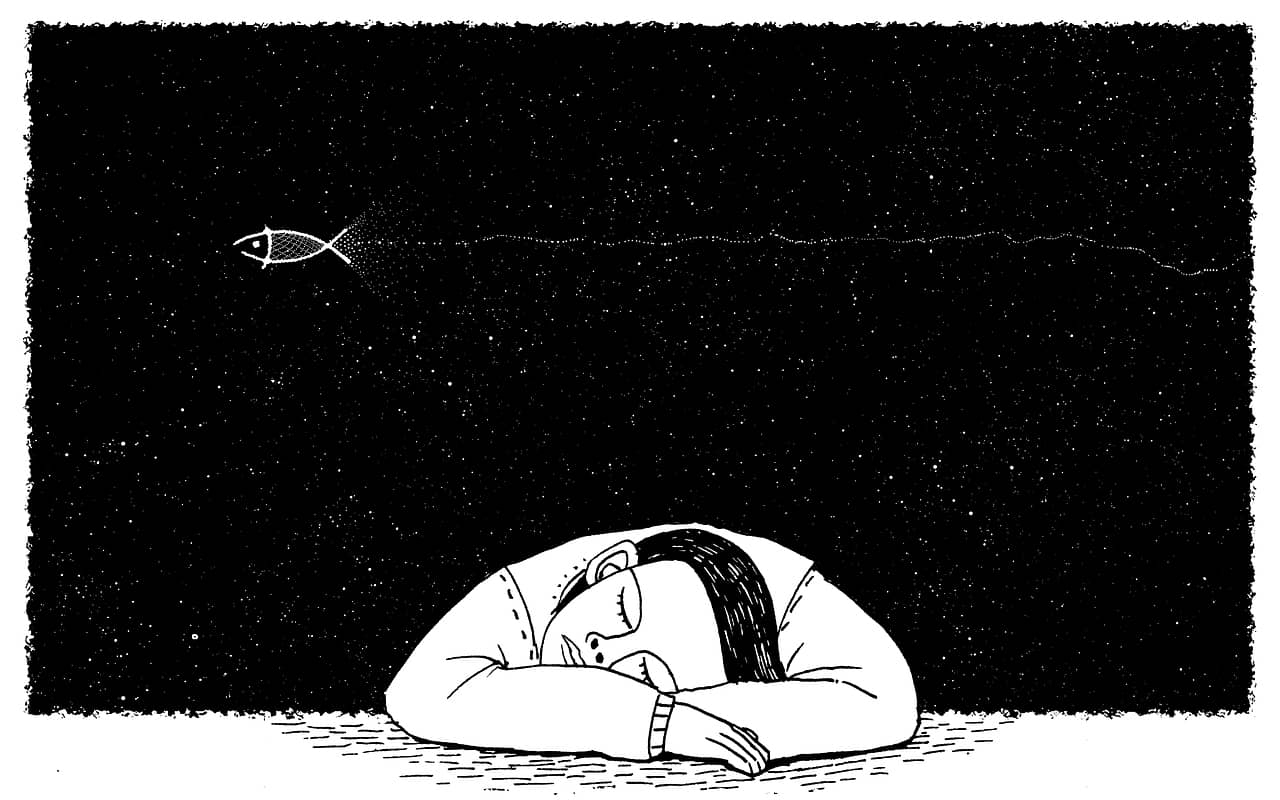
Everything seems to come down to the same four or five tips:
- Go to bed at the same time
- Intend to remember your dreams
- Don’t jump out of bed in the morning
- Etc.
Don’t get me wrong. Some of those tips are good.
But they’re not game changers.
If you want to remember multiple dreams each and every night, you’re in luck.
I’ve remembered my dreams for many years now as part of my memory research.
Although I won’t bore you with excerpts from my voluminous dream diaries and journals, I will share with you the real deal steps that have helped me.
And no, I never leap out of bed just to write down a dream.
It’s simply not necessary when you have the skills you’ll learn today.
Excited?
Let’s get started with the real deal on how to improve dream recall quickly.
And more importantly, how to improve it thoroughly.
Why Can’t I Remember My Dreams: The Answer
Would you like the real answer?
I’ll be blunt and pull the bandaid away quickly:
No one knows.
Scientists don’t even know why or how the brain produces consciousness after all. This fact is sometimes called the hard problem of consciousness.
Now, some scientists claim that you might not recall dreams due to a lack of REM sleep.
Frankly, I don’t think this explanation makes sense. For example, some researchers think that daydreaming and REM sleep are closely related.
Ask yourself:
How many day dreams do you remember?
Compare that to how many TV series and movies you remember, not to mention how much you remember of conversations throughout the day.
We can talk all day about different theories about why some people don’t remember dreams. It could stem from sleep disorders, how sleep affects memory or aphantasia.
So the bitter pill remains: No one really knows.
Except for one strong suggestion:
People who cannot remember dreams don’t have a strategy.
If I don’t use the steps you’re about to learn, I don’t remember dreams either.
But when I use these steps, I remember dozens of dreams each and every week.
How To Remember Dreams In 8 Steps
Many of the steps that follow will be familiar to you. But the Memory Palace aspect will probably be new.
I suggest that you not cherry pick the steps that make sense to you. Instead, combine all of them together.
And commit to at least 90 days in order to formulate the habit of dream recall.
Let’s get started by saying more about the “design” of your personalized dream recall project.
Step One: Commit To 90 Days
I first encountered the 90 day rule for habit formation in 59 Seconds by the scientist Richard Wiseman. The same principle is reiterated in other books, such as Atomic Habits by James Clear.
The reason you need this amount of time is clear:
The brain and its habits are guided by neurochemical connections in the brain. You need robust amounts of dopamine and myelin, along with all kinds of opioid receptors firing in order to truly establish a routine that lasts.

Now, I don’t advocate fixed routines as such, but you will want to establish them.
And if you’re interested in sleep and dreaming science, Richard Wiseman is really great because one of his follow-up books to 59 Seconds is Night School.
Step Two: Read About Dreaming
The more you know about dreaming, the more you’ll develop metacognition about it.
In other words, you’ll not only think about dreaming. You’ll start to think about how you’re thinking about dreaming.
You may also start to realize that you are composed of different kinds of memory systems, even while you’re awake. Soren R. Ekstrom puts it like this in his book Memory and Healing: Neurocognitive and Psychodynamic Perspectives on How Patients and Psychotherapists Remember:
“Memory consists of both conscious and unconscious systems. Some memory may even be labeled nonconscious in that it functions automatically, beyond awareness, as when we apply grammar to our thought processes. The unconscious systems, often called implicit , are devoid of the subjective internal experience of correctly recalling information, such as our sense of the time or place for when an event occurred.”
The more you learn about these systems, the more you’ll become attuned to the nature of how you experience human subjectivity.
My favorite expert on dreaming is Robert Langs. Before he passed away, I underwent dream-based psychoanalysis with him and have read many of his books. They are excellent for helping you discover what dream recall is really all about: resolving the problems that emerge when your ego tricks you into taking your “self” too seriously.
As Wei Wu Wei puts it:
“Why are you so unhappy?
Because ninety-nine percent of what you think,
And everything you do,
Is for your self,
And there isn’t one.”
Three: Use The Power Of Intention
In Dreams 1-2-3, J.M. Debord suggests making “I will remember my dreams” into a mantra that you say as if it were a prayer.
I don’t think you have to go that far, but it makes sense to put some intensity into it.
The trick is to be willing to let go of the outcome. This is really important because so many dream recall manuals (like Debord’s) make indefensible claims. For example, Deboard says unprovable things like: “The memories of your dreams are never lost, just stored away.”
Statements like this are nonsense.

A better mental attitude is to intend to remember your dreams and simply not care if you forget some of them.
Remember, most of the day is also forgotten. And good riddance to a lot of it.
Focus instead on remembering your dreams and cultivate an “attitude of gratitude” for when you do recall dreams.
Four: Prepare Your Dream Journal In Advance
Back in 2008, my real breakthroughs in dream recall started when I not only kept a journal, but prepared it in a particular way.
First of all, I decorated the dream journals. This is part of making the intention to remember dreams.
Then, each night, I wrote the date of the following morning. As I did, I would mentally reflect upon my intention to remember my dreams.
Finally, I kept the dream journal where I would always see it every time I was in the bedroom. I also got a special pen just for writing down my dreams and placed this on top of the dream journal.
I realize adhering to these steps can all seem a bit OCD, but as we’ve learned from people like Jill Price, adopting a little bit of wackiness into our lives can improve recall.
Five: Write Something Down No Matter What
No doubt about it.
It can feel frustrating to go through the preceding steps and still not remember dreams.
But it happens. And I decided that I would always write about it anyway.
Some mornings I simply wrote: No dreams remembered.
Other mornings, I wrote a bit more, reflecting on why I might not have recalled any dreams.
I believe that writing even when you can’t remember dreams helps because it imprints the behavior as a formal act. Even if it is empty of the content you want (dreams), you are at least going through the motions.
Give it a try and remember the 90 day rule. If it helps, you can memorize it in the form of “Metivier’s Razor.”
Less than 90 days of study and practice of (almost any) accelerated learning technique does not deserve the phrase, “I tried.”
Six: Draw
When writing down your dreams, you don’t have to use words all the time. Sometimes you’ll dream abstract shapes and scenarios that you can’t quite describe in words.
You don’t have to be an artist to incorporate simple sketches.
Seven: Use A Memory Palace
Getting up in a rush to write out your dreams can cause you to lose a lot of sleep.
It’s definitely worth it to kick start your new dream recall skillstack. However, you only want to do that for as long as absolutely necessary.
As soon as you can, start to use a Memory Palace.
For remembering dreams with this technique, I use a very simple setup based on the room I’m sleeping in.
I use the four corners and four walls as soon as I come into awareness. Then, I project onto the stations of the Memory Palace associations that help me remember the images and ideas in the dreams I experienced during the night.
If you’d like to learn more about creating and using Memory Palaces, please consider completing this free course:
Here’s an example of how it works based on a recent dream:
I was showing my wife a giant dinosaur statue in the middle of a street in the city where I grew up in Kamloops. I explained that there used to be an even bigger statue and then we watched the Flintstones in a hotel room.
When I awoke, I projected the image of a dinosaur onto the wall and had Fred Flinstone sliding down its tail.
Then I exaggerated the image and went back to sleep.
Eight: Reflect On Your Dreams
Once you write down your dreams, it’s important to reflect on them.
I’m not talking about interpreting them. I don’t believe in any such thing.
Rather, I’m talking about thinking about the kind of dream it was in terms of category. For example, was it:
- Filled with familiar people and references?
- Abstract?
- Were there any symbols or shapes?
- A clear narrative?
- A mix of episodes with nothing connecting them?
- Scary in any way?
- Emotions?
- Familiar locations?
By asking these questions frequently, I’ve observed themes and patterns over the years that occur repeatedly.
Rather than dwindle in self-delusion and lead myself into pseudoscientific and mystical conclusions, I let these observations stand for what they are: shadowy reflections of what life is like.
Like dreams, life is filled with all kinds of familiar people and associations. But it is also filled with abstractions and episodes that lack clarity. Any clarity we do have is usually short lived.
Note: I believe that dream recall is about the process, not the product.
Although I do find it fun to read over my dreams once in a while, I have thrown away many dream journals.
What is much more precious is the act of recapturing them and using them in my reflective thinking about the patterns of life.
Why Dream Recall Is So Fulfilling
Connecting deeply with what I remember from my sleep has the benefit of recapturing lost time.
Life feels fuller because it is literally longer when you can reliably remember multiple dreams.
And it takes just a few minutes a day to write these dreams down. When re-reading them over the years, I’ve also remembered more about the general scenarios during those times, which is deeply fulfilling.
Some people think that working with dreams can clear out negative memories from the past. This might be the case, as more and more science shows that engrams might be real.
Some of my research into memory and meditation also shows that working with memory in particular ways can help with issues like depression and PTSD.
Ultimately, I think it’s too soon to say.
By the same token, I have clearly benefited from working with my dreams, even if I’m not prepared to make any fast and hard statements about exactly why or how.
But it’s pretty simple, really:
Working with the mind is a good thing. It’s another form of brain exercise.
And if you have any concerns about messing around with your dreams, just as you would before starting a fitness routine, see a qualified medical professional first.
So, what do you say?
Are you ready to start remembering more dreams?
Feel free to share some of yours in the comments below and enjoy your new take on being alive at night.
Related Posts
- How to Remember Polyatomic Ions: The Ultimate Guide
Learning how to remember polyatomic atoms is easy and fun. Learn how to memorize at…
- How to Remember What You Read: 11 Proven Steps
Although there is no best way to read, if you want to remember what you…
- How to Remember Where You Put Something (Once and For all)
If you want to know how to remember where you put something, you need expert…











2 Responses
Cool stuff! I’ve kept a dream journal for a while but cannot seem to recall my dreams recently. I like the tip that I should practice the act of writing something down even if I remember nothing.
Yes, that simple act of writing something down even if nothing is remember is key. It helps develop procedural memory for the habit of dream recall. And it tells the mind that you place a premium on the goal of remembering dreams.